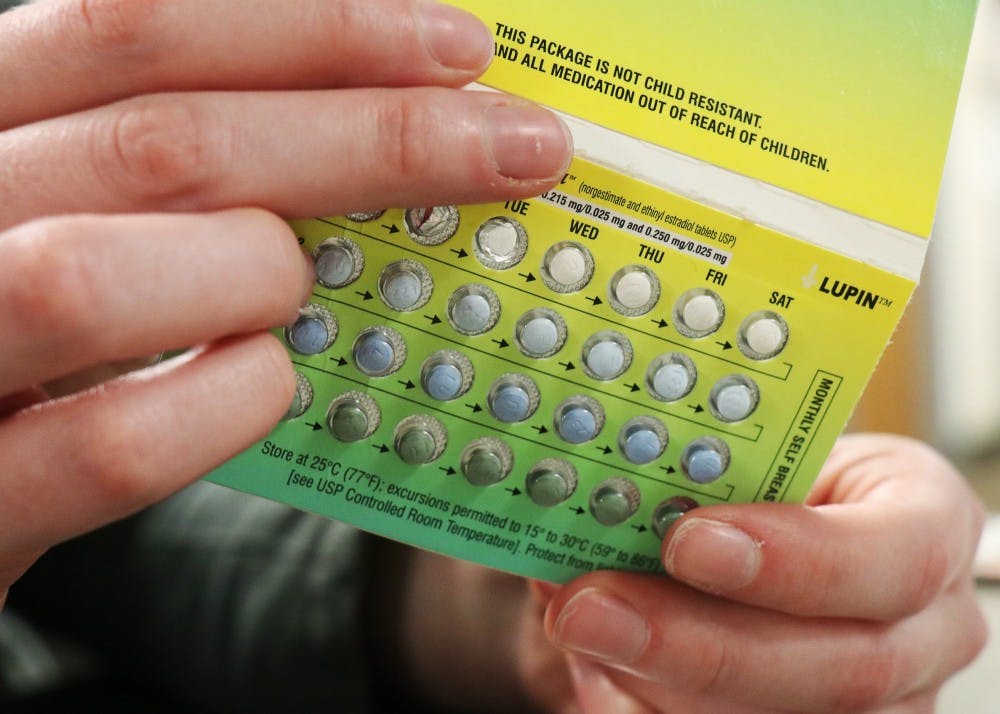IU senior Chris Jesse was worried when President Donald Trump was elected.
She had followed his stances on access to birth control and knew there was a possibility Trump would limit that access to brith control during his presidency. In response to this, Jesse decided to get an intrauterine device, a birth control method that is inserted into the uterus and lasts 3 to 12 years depending on the type, according to the Planned Parenthood website.
Like some other IU students, Jesse ran into obstacles in Bloomington that prevented her from accessing birth control, including the ability to pay and a lack of knowledge and education about local options.
Jesse ended up getting the procedure done in her hometown instead of in Bloomington. The IU Health Center did not take her health insurance and she could not find a gynecologist in town with availability in the near future.
The Bloomington community has more options for access to birth control than other communities in Indiana, however limited awareness about local options is one barrier students face.
There are three main places where students can obtain birth control, in addition to gynecologists that often have limited new-patient availability. These clinics include the IU Health Center, Planned Parenthood Bloomington Health Center and Futures Family Planning Clinic.
All three clinics offer a full selection of birth control options from prescriptions pills to one of the newest forms of birth control, Nexplanon, an implant inserted into the arm that offers three years of continuous birth control. The clinics also offer education and counseling on which option is best for an individual.
However, complications can come with birth control prices and insurance coverage.
The IU Health Center takes some insurance plans but does not take others, including Medicaid and Healthy Indiana Plan, an insurance provided through the Affordable Care Act to many people who previously did not have health insurance through their employers.
Planned Parenthood and Futures Family Planning Clinic take both of those and many others.
Penny Caudill is an administrator at the Monroe County Health Department, which funds Futures Family Planning Clinic.
“We try to take any bit people have,” Caudill said, referring to people’s insurances. “And that can be a process.”
Caudill also said at Futures, birth control is priced on a sliding scale based on income. However, paying out of pocket can still be relatively expensive for clients if they don’t have insurance coverage.
At Futures, a "certified navigator" is in the clinic once a week to help people find out if they are eligible for the Healthy Indiana Plan.
“I think that really helps ensure that people know what their options are and really know how to navigate them,” Caudill said. “Some people have never had insurance before so they don’t know what they have.”
Another barrier to birth-control access is a lack of sex education in primary and secondary schools.
Catherine Sherwood-Laughlin, a clinical professor at the IU School of Public Health, said she believes education is equally as important as accessibility when it comes to birth control methods.
Sherwood-Laughlin is trying to combat this issue by helping teachers and parents on campus and in the community become sex educators at home or at school. She said the goal is to help teenagers have the knowledge to make informed decisions and plan for the future.
“I think education is key to making sure that young adults and teenagers have the information so they can make informed decisions,” Sherwood-Laughlin said. “It allows people to make that decision as to when they’re ready to have children.”
Jesse recently took a course about human sexuality, which is open to all IU students through the School of Public Health, and she said it was an eye-opening experience.
She said she wishes that more students would take it because of the valuable information it provides, including how birth control methods work.
“I think for a lot of people it’s different to learn about it and it’s different to hold a condom and talk about how to get birth control because you know, people just google it and hope that the internet has the answer because no one has actually ever had that conversation with them,” Jesse said. “They’ve never had anyone to talk to about it.”




